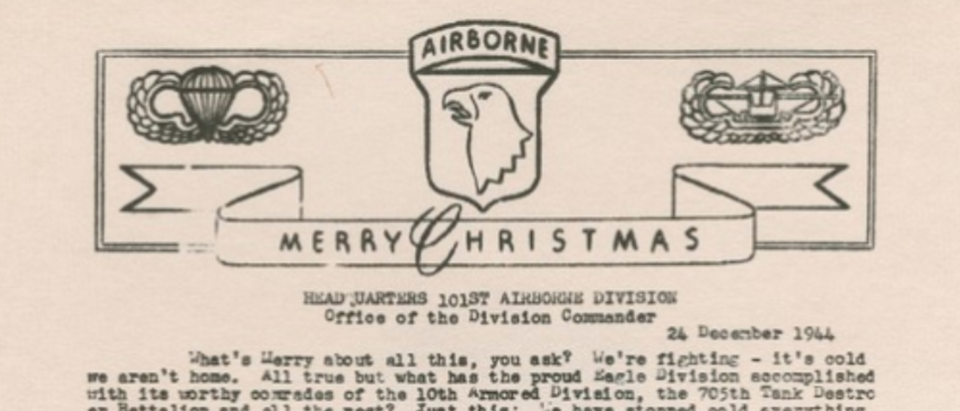Surrounded and greatly outnumbered, the men of the 101st Airborne Division were not expecting a merry Christmas in Bastogne, Belgium, in 1944.
The German army had already begun a brutal offensive against the entrapped Americans, and on Dec. 22, under a white flag, messengers had delivered the German general’s demand of unconditional surrender.
Brigadier General Anthony McAuliffe sent back just one word — NUTS! — to the German commander. When the German messengers appeared puzzled by the term, one of McAuliffe’s attaches told them that, loosely translated, they could “go to hell.”
McAuliffe then penned a letter to his own troops, in recognition of the imminent holiday, informing them of the events that had transpired.
75 years ago this Christmas Eve, Gen. Anthony McAuliffe wrote this letter to his troops during the Battle of the Bulge. Today we remember the service members who served during the holidays both then and now and wish you a Merry Christmas! #NoVeteranEverDies pic.twitter.com/VuYyhYqqVj
— National Cemeteries (@VANatCemeteries) December 24, 2019
McAuliffe’s letter began under the simple header, “Merry Christmas.”
What’s Merry about all this, you ask? We’re fighting — it’s cold, we aren’t home. All true but what has the proud Eagle Division accomplished with its worthy comrades the 10th Armored Division, the 705th Tank Destroyer Battalion and all the rest? Just this: We have stopped cold everything that has been thrown at us from the North, East, South and West. We have identifications from four German Panzer Divisions, two German Infantry Divisions and one German Parachute Division. These units, spearheading the last desperate German lunge, were headed straight west for key points when the Eagle Division was hurriedly ordered to stem the advance. How effectively this was done will be written in history; not alone in our Division’s glorious history but in World history. The Germans actually did surround us, their radios blared our doom. Their Commander demanded our surrender in the following impudent arrogance:
McAuliffe then included the text of the letter he had received from the German commanding officer, demanding the surrender of American troops in Bastogne and promising the destruction of the city — and civilian casualties — if the Americans did not surrender within two hours’ time.
To the U. S. A. Commander of the encircled town of Bastogne.
The fortune of war is changing. This time the U. S. A. forces in and near Bastogne have been encircled by strong German armored units. More German armored units have crossed the river Ourthe near Ortheuville, have taken Marche and reached St. Hubert by passing through Hompres-Sibret-Tillet. Libramont is in German hands.
There is only one possibility to save the encircled U. S. A. Troops from total annihilation: that is the honorable surrender of the encircled town. In order to think it over a term of two hours will be granted beginning with the presentation of this note.
If this proposal should be rejected the German Artillery Corps and six heavy A. A. Battalions are ready to annihilate the U. S. A. Troops in and near Bastogne. The order for firing will be given immediately after this two hour’s term.
In addition, the German commander suggested that any civilian casualties would be the fault of the Americans should they fail to acquiesce.
All the serious civilian losses caused by this Artillery fire would not correspond with the well known American humanity.
The German Commander
McAuliffe also included his own reply to the Germans’ demands.
The German Commander received the following reply:
22 December 1944
“To the German Commander:
N U T S !
The American Commander”
McAuliffe concluded with his own final words of encouragement, ensuring his men that their efforts would not be in vain.
Allied Troops are counterattacking in force. We continue to hold Bastogne. By holding Bastogne we assure the success of the Allied Armies. We know that our Division Commander, General Taylor, will say: “Well Done!”
We are giving our country and our loved ones at home a worthy Christmas present and being privileged to take part in this gallant feat of arms are truly making for ourselves a Merry Christmas.
McAuliffe’s Screaming Eagles — as the 101st Airborne Division has long been known — earned themselves a new nickname in the hours that followed: the Battling Bastards of Bastogne. They held Bastogne through Christmas Day, in spite of near constant shelling and limited supplies, until General George Patton arrived with the Third Army on the 26th, punching through the German lines and breaking their hold on Bastogne. (RELATED: A Savior When You Need It Most: A Christmas Message Delivered Amid The Blood And Snow Of Bastogne)


